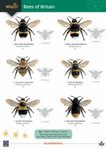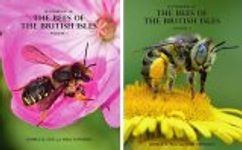![What Do Bees Think About? What Do Bees Think About?]()
Click to have a closer look
About this book
Contents
Customer reviews
Biography
Related titles
About this book
Have you ever observed a bee up close and wondered what was going on inside its head? Like ours, insects' brains take up most of the space in their heads, but their brains are smaller than a grain of rice, only 0.0002% as large as ours. But what purpose does the insect brain serve, and how does that drive their creativity, morality, and emotions?
Bees in particular exhibit unexpected and fascinating cognitive skills. In What Do Bees Think About? animal cognition researcher Mathieu Lihoreau examines a century of research into insect evolution and behaviour. He explains recent scientific discoveries, recounts researchers' anecdotes, and reflects on the cognition of these fascinating creatures. Lihoreau's and others scientist's research on insects reinforces the importance of protecting and preserving insects such as bees: after all, our survival on the planet is deeply dependent on theirs. This book provides an eye-opening window into the world of insect cognition and echoes an important ecological message about bees – they are intelligent creatures sharing the same fragile ecosystem as us.
Originally published in French in 2022 as À Quoi Pensent les Abeilles by humenSciences/Humensis.
Contents
Series Editor's Foreword
Prologue. What Is a Bee?
1. A Poor Sense of Direction
In a Bee's Head
Everyone on the Dance Floor
A Vector of Misinformation
The Traveling Salesman Problem
Cognitive Map and Cognitive Load
2. The Fragrance of Déjà Vu
The Scent of Hydrocarbons
The Misunderstood Cockroach
Golf, Cheaters, and Peep Shows
A Miniature Theory of Mind?
3. The Limits of a Miniature Intelligence
On the Shoulders of Turner
Flower Power
Concepts and Arithmetic
Bumblebees Aren't Always in a Good Mood
A Miniature Imagination
Consciousness and the Temptation to Anthropomorphize
4. The Superorganism
Simple and Complex
The Wisdom of the Crowd
It Takes All Kinds
Insects and Robots
This Election Is Rigged!
5. Achilles' Heel
The Harmful Effects of Nicotine
Rock Isn't Dead
The Badger and Preventive Measures
The Second Brain
Five Fruits and Vegetables a Day
Waiting for the Next World
Epilogue. After All, We're All a Bit Like Bees
Acknowledgments
Notes
Customer Reviews
Biography
Mathieu Lihoreau is an evolutionary biologist and animal cognition researcher at the Behavioral and Cognitive Ecology Lab in the Center for Integrative Biology at the Universite de Toulouse.
Translator and book editor Alison Duncan earned her master of science in translation from New York University and her bachelor of arts in French and Francophone studies from Vassar College. She is the translator of Marvelous Microfossils: Creators, Timekeepers, Architects.


































